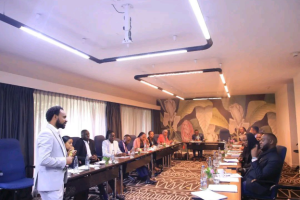
Ethiopia, a country with a rich history and vibrant culture, has been actively working towards strengthening its foreign relations to foster economic growth, regional stability, and global partnerships. As the nation looks towards the future, it has identified key areas of focus for its foreign engagements, aiming to promote mutual cooperation and address pressing challenges.
Ethiopia’s foreign policy has long emphasized non-alignment, advocating for regional integration, and maintaining peaceful coexistence with neighbouring countries. However, in recent years, the country’s global engagement has expanded significantly, driven by its ambitious development agenda and the recognition of the importance of international collaboration. The green legacy initiative is one of the country’s contributions to the global boiling issue of climate change.
One of the primary areas of focus for Ethiopia’s foreign relations is economic cooperation. Recognizing the significance of trade and investment in driving economic growth, the country has been actively seeking partnerships with both established and emerging economies.
The country’s vast agricultural resources, growing manufacturing sector, and strategic location make it an attractive destination for foreign investors. The country’s proximity to the sea and geopolitical location are other blessings to the country’s economic cooperation works.
The government has implemented various policies to attract foreign direct investment, improve the business climate, and facilitate technology transfer. Especially in recent years, the government has tried to fix some investment hurdles by amending policies related to foreign investment.
Additionally, the country has been actively engaging in regional economic integration efforts, particularly within the framework of the African Continental Free Trade Area (AfCFTA), aiming to boost intra-African trade and enhance economic cooperation across the continent.
Another critical aspect of Ethiopia’s foreign relations is regional stability and security. The country recognizes the importance of maintaining peaceful relations with neighbouring countries to foster stability and address shared challenges. Ethiopia has played a significant role in mediating and facilitating peace processes in the Horn of Africa region. For instance, it has been actively involved in the peace negotiations between Sudan and South Sudan, striving to resolve conflicts and promote reconciliation. The country’s indispensible role for Somalia’s peace in combating Al-Shebab shows how Ethiopia is striving for regional stability.
Furthermore, Ethiopia has been working closely with other East African nations to address regional security threats, such as terrorism and illicit arms trafficking, through collaborative initiatives and joint military operations. According to a UN report, Ethiopia is the largest troop contributor to UN peacekeeping, with over 8,300 uniformed personnel, the vast majority of whom serve in Darfur (UNAMID), Abyei (UNISFA), and South Sudan (UNMISS). However, the country has not yet gained anything from countries that gain Ethiopia’s support. So, there is a need for diplomatic negotiations and other bilateral relations with the countries to achieve the country’s future diplomatic focus areas.
In a similar vein, since Prime Minister Abiy Ahmed came to power, Ethiopia’s diplomacy has expanded to include bilateral and multilateral relations with Middle Eastern countries such as the UAE and China. The strategic partnership with Russia has also been instrumental in assisting Ethiopia during times of trouble. The new driving force behind Ethiopian foreign policy is a focus on citizen-based diplomacy, aiming to actively involve Ethiopians living abroad in the country’s activities, both politically and economically, as well as engaging the diaspora community. So, in the dynamic world of politics, Ethiopia should base its diplomatic activity on dynamic global politics. This helps the country’s ambition for technological advancement because these nations possess advanced technologies and expertise in various sectors, including infrastructure development, manufacturing, and information technology.
Also, identifying the focused area is another important thing to protect and ensure the country’s national interest.
In an exclusive interview with The Ethiopian Herald, Anteneh Getachew (Ph.D) an Asia and Pacific researcher at the Institute of Foreign Affairs, highlighted how diplomacy has evolved from religious and trade diplomacy to include new areas such as cyber diplomacy, climate diplomacy, and geo-economic and geopolitical issues. Ethiopia, as a country, has focused on protecting its national and strategic interests.
Anteneh emphasized that the future of Ethiopian diplomacy will be focused on safeguarding the country’s sovereignty, which is a crucial strategic concern. He also highlighted the importance of economic development and prosperity in ensuring the country’s stability. Anteneh mentioned that access to the sea and becoming a regional hub for hydropower, through initiatives like the Grand Ethiopian Renaissance Dam (GERD) diplomacy, are key to achieving these goals.
On an international level, Anteneh stressed the importance of maintaining diplomatic relations and promoting peace and security, both regionally and internally. He emphasized that economic development; national unity, sovereignty, and continuity as a state are Ethiopia’s strategic issues and national interests.
He noted that achieving the country’s strategic interests requires engaging not only with countries but also with non-governmental organizations, think tanks, transnational companies, and other entities. He emphasized the need to build the country’s image and address geopolitical challenges. Adapting to the dynamics of world politics is also essential for successful diplomatic activities, he added.
Anteneh further highlighted that economic development plays a crucial role in ensuring the country’s existence, and leveraging Ethiopia’s geopolitical capacities, such as GERD and access to the sea, is vital for economic development and diplomatic achievements.
Drawing upon Ethiopia’s historical diplomatic achievements and its contributions to regional and international peacekeeping missions, Anteneh emphasized the need for the country to gain benefits from its diplomatic activities.
He highlighted several recent diplomatic achievements of the country during the past five years of reform. These include efforts in peace diplomacy, the implementation of green initiatives, regional infrastructure integration (including the Trans-Africa Road), and championing different diplomatic influences in addressing internal conflicts and the GERD (Grand Ethiopian Renaissance Dam) issue.
Regarding diplomatic relations with neighbouring countries, Anteneh emphasized the importance of building trust and conducting negotiations based on bilateral or multilateral agreements. He stressed the need to strengthen diplomatic relations at the head of state or government level, as well as through engagement with think tanks, diplomats, and ambassadors, to achieve cumulative positive results.
Anteneh emphasized the potential for misinformation and disinformation campaigns to proliferate with the rise of artificial intelligence, underscoring the importance of exploring the best approaches to deal with these challenges. He mentioned that the Foreign Minister, along with national-level officials, is working to adapt to these new diplomatic activities.
Ethiopia has an institute dedicated to artificial intelligence that provides training for youth and new diplomats, thereby advancing the country’s diplomacy and aligning it with global standards. The government is also committed to safeguarding national interests in the diplomatic arena through the use of advanced diplomatic strategies.
He stressed that Ethiopia will continue to collaborate with entities that protect and benefit the country’s national interests. Ethiopian diplomats must remain cautious and maintain a balanced approach in an inconsistent world order. Strengthening internal policies is essential to fortify the country’s foreign policy. By bolstering internal unity, Ethiopia can effectively navigate any diplomatic influences and employ tactical diplomacy to its advantage.
BY EYUEL KIFLU
THE ETHIOPIAN HERALD WEDNESDAY 24 JANUARY 2024



